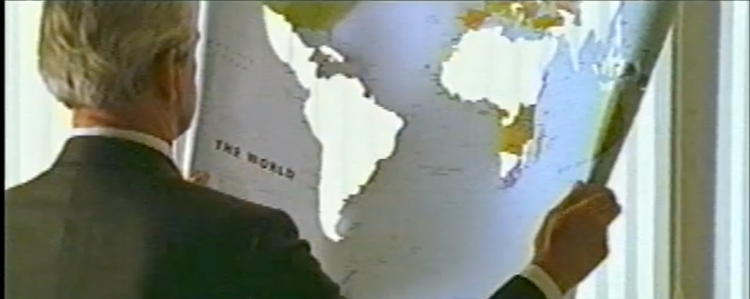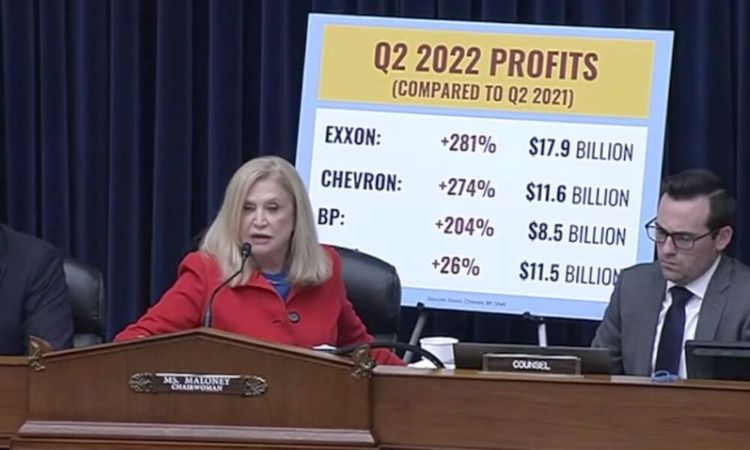Drilled Down: The Technical Summary Kinda Slaps (IPCC Mitigation Report, Part 2)
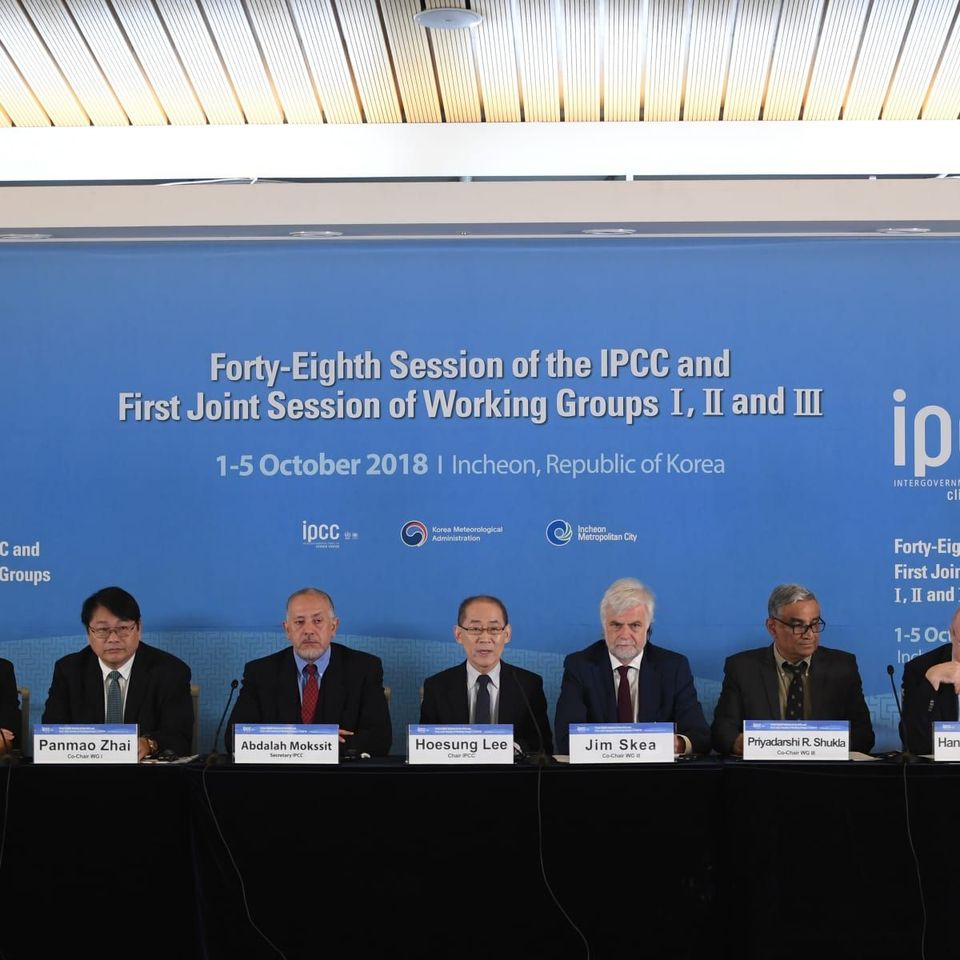
All month long I'll be slowly making my way through the IPCC report and highlighting pieces I think folks should pay special attention to. If there's an expert you think I should interview, or a piece of the report you want to draw my attention to, please drop me a line! I'm at amy@criticalfrequency.org or on Twitter @amywestervelt. If you missed Part 1 of this series, you can find it here. An audio component with some additional stuff on the Summary for Policymakers and a preview of what we'll be digging into when we get to Chapter 13 is also available here (if you prefer to listen in your favorite podcast app, here's a menu that will take you to the show wherever you like to listen). Yes, it was on Chapter 5 and now we're going back to the Technical Summary – I'm reading the report out of order because it helps me pay attention and because when a researcher tells me about something they think is particularly interesting I tend to go straight to it rather than wait until I've waded through the 1000 pages before it. If you're looking for the report in its entirety you can download it here. If you want to follow along with the Technical Summary, you may also download it separately here. I'm making this series free to all, including other publications that want to re-post anything from it (with attribution). If you'd like to support Drilled, and gain access to subscriber-only content, you can upgrade via this button:
Forget the Summary for Policymakers, the Technical Summary Is Where It's At
If I could give other journalists covering this report just one piece of advice, it would be this. The Summary for Policymakers (SPM) goes through a tedious approval process during which representatives from 195 governments (some of them very dependent on our continued dependence on fossil fuels, cough cough the U.S. and Saudi Arabia, I'm looking at you). The Technical Summary, on the other hand, comes straight from the authors and is generally released at the same time as the SPM. As Max Boykoff, a contributing author to Ch 13 (on policy) put it: "The technical summary is the one that's prepared by authors of the report. So it does go through a review process by governments and experts, but ultimately the authors have a say there." Whereas with the SPM, while authors can reject input that would make the summary inaccurate, that seems to be the most they can do to maintain the integrity of that document; preventing it from becoming a mealy-mouthed political document on the other hand, not so much.
I'm not sure why anyone in media bothers with the SPM at all anymore except that it is shorter and maybe sounds less intimidating? The Technical Summary might add a few more pages (it's 145 pages in total), but is so much more clearly written and straightforward it doesn't take much longer to read and gives a much more accurate summary of what's actually in the report. Again, it absolutely screams: Do something! Here are several options!
At the press conference announcing the release of the report, Diana Ürge-Vorsatz, a contributing lead author of the Technical Summary and vice-chair of Working Group III noted: "in every sector there are options available that can at least halve emissions by 2030 and keep open the possibility of limiting warming to 1.5 degrees."
Some highlights to take note of:
- Climate action and alleviating poverty are not mutually exclusive. In fact, sustainable development requires climate mitigation. Longstanding research, as well as newer data underpinning this are in both Chapter 5 and Chapter 3. Again, this debunks an argument the fossil fuel industry has been trotting out again recently, an oldie but a goodie (baddie?), that robbing less-developed countries of carbon-intensive development would commit them to eternal poverty. Ironic given that it was the fossil fuel industry that originally argued that less developed countries must participate in any mandatory emissions reductions scheme to make it "fair." In any case, the research is clear: there is no high-carbon development pathway that also avoids climate risks, which means the myth of risk-free, cheap, fossil fueled development is just that...a myth.
- Effective climate action requires multisolving. Shout out to Dr. Elizabeth Sawin who coined the term "multisolving" to summarize what the IPCC is talking about when it says: "Accelerating mitigation to prevent dangerous anthropogenic interference with the climate system will require the integration of broadened assessment frameworks and tools that combine multiple perspectives, applied in a context of multi-level governance (high confidence)." In other words, climate policies that don't take into account the whole spectrum of society, life, the economy are unlikely to succeed. On the website of the Multisolving Institute, the organization Sawin founded to focus on solutions that solve for multiple problems across sectors, she writes: "A good example is how walkable cities help reduce emissions from transportation, provide equitable access to mobility, create healthier citizens, and help local businesses thrive. Multisolving is a way to look at the whole picture and help everyone."
- Oh hello, we're talking about power, not just energy. Although scrubbed entirely from the SPM, the power dynamics at play when it comes to climate policy are clearly acknowledged here. Under a rather innocuous bullet point about how "the speed, direction, and depth of any transition will be determined by choices in the environmental, technological, economic, socio-cultural and institutional realms," the summary notes:
The interaction between politics, economics and power relationships is central to explaining why broad commitments do not always translate to urgent action.
Further on in the summary, it notes:
Many net zero targets are ambiguously defined, and the policies needed to achieve them are not yet in place. Opposition from status quo interests [aka polluting industries], as well as insufficient low-carbon financial flows, act as barriers to establishing and implementing stringent climate policies covering all sectors.
And then it tackles misinformation head on. This is the first IPCC cycle that has included the impact of misinformation at all. The Working Group II report included it in a few spots (particularly North America-specific parts of the report), but to see it right up front in the Technical Summary is refreshing, and I think a sign of the increased involvement of social scientists in this assessment.
A broad group of actors influence how climate governance develop over time, including a range of civic organisations, encompassing both pro-and anti-climate action groups. Accurate transference of the climate science has been undermined significantly by climate change counter-movements, in both legacy and new/social media environments through misinformation
- You cannot solve for climate while building new fossil fuel infrastructure. Kind of a no-shit conclusion, but plenty of countries are still doing this—during the approval process for this very report in fact U.S. President Joe Biden announced a massive buildout of fossil fuel infrastructure painted as a short-term fix to Europe's dependence on Russian gas (as though the country of origin is the problem, not the dependence itself.) The Technical Summary states in no uncertain terms:
"Estimates of future CO2 emissions from existing fossil fuel infrastructures already exceed remaining cumulative net CO2 emissions in pathways limiting warming to 1.5°C with no or limited overshoot (high confidence)."
Underneath that heading, the summary notes:
Decommissioning and reduced utilisation of existing fossil fuel installations in the power sector as well as cancellation of new installations are required to align future CO2 emissions from the power sector with projections in these pathways (high confidence).
Emphasis is mine here, but what the research shows unequivocally is that not only can we not build ANY new fossil fuel infrastructure, but that we must begin to decommission the infrastructure that already exists and transition off of fossil fuels...yesterday.
- Rich people are a problem. A really key point that's often missing from arguments about individual vs. systemic change is that research shows that the top 10% of individuals globally have a truly out-sized impact on both the problem and the solution. The Technical Summary states: "Globally, households with income in the top 10% contribute about 36-45% of global GHG emissions (robust evidence, medium agreement)." That "robust evidence, medium agreement" bit is both hilarious and kinda the real problem here. Much—maybe even most—of the global top 10% don't think of ourselves as wealthy. And part of that has to do with systemic issues as well. Those of us in hyper-competitive capitalist societies tend to feel as though we're struggling to survive and our options are constrained. Sometimes they are, sometimes we can make better choices. When we can, we should, and crucially those choices aren't and shouldn't be just about consumption. Civic action, community organizing, talking to your neighbors, career choices, investment choices, modeling behavior—all of these are also individual actions that can help to drive systemic change. Towards the end of the Technical Summary, for example, the authors note: "Social influencers and thought leaders can increase the adoption of low-carbon technologies, behaviours, and lifestyles (high confidence)."
- No country is currently doing enough. Or even pledging enough. In one part of the Technical Summary, authors note: "Current national pledges under the Paris Agreement are insufficient to limit warming to 1.5°C with no or limited overshoot, and would require an abrupt acceleration of mitigation efforts after 2030 to likely limit warming to 2°C." The Technical Summary points to both an "emissions gap" —the discrepancy between the emissions that countries are reporting and what's being observed by scientists—and an "implementation gap"—the discrepancy between pledges to reduce emissions and what adopted policies can actually deliver. Pledges or policies delivering anything close to meaningful emissions reductions by 2030 are virtually non-existent—everyone is punting to the 2050 deadline, which is not in line with the science.
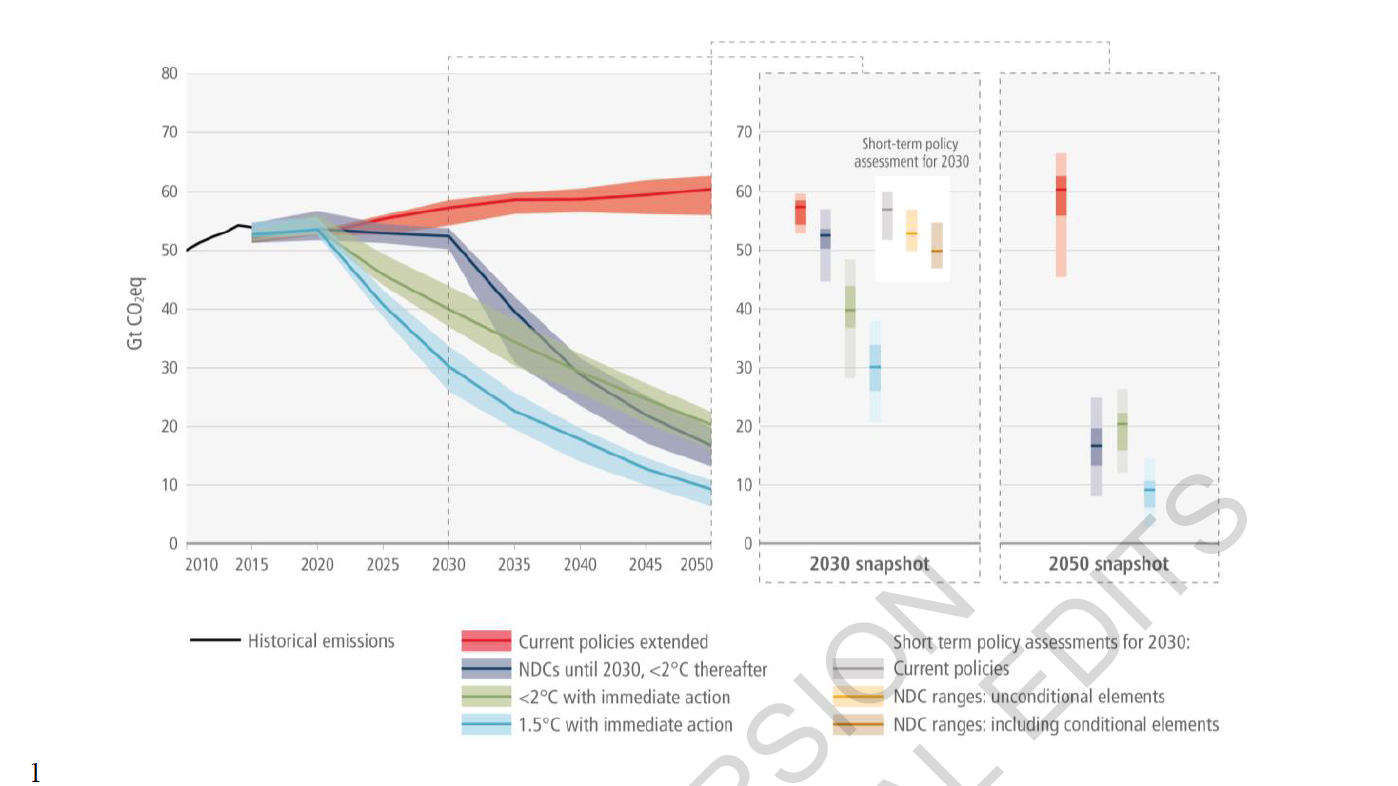
- We only need CDR (Carbon Dioxide Removal) because we're failing to reduce emissions and kick the fossil fuel habit. There's a lot about CDR throughout this report, much of it underscoring that it's now absolutely necessary to deploy CDR to stay within the 1.5 degree target. But the report also makes clear why that's the case: because not enough action has been taken to reduce emissions and transition off of fossil fuels.
- Incremental change won't cut it. Hallelujah. We all know it's true, but it's fantastic to see it stated clearly in an IPCC report. The window for effective incremental solutions has closed. Ya coulda done that in the 1990s, would have been great! But you didn't and now we've got all the additional challenges brought on by rapid change (and yes, the change will be rapid one way or another--either in a planned way, by taking action now, or in utter chaos by choosing not to act, there is no change-free option). In IPCC speak: "There is a need to explore how accelerated mitigation could close both emission gaps and implementation gaps."
- Focus on the energy source and ignore the power structure at your peril. Okay honestly, I feel personally vindicated by this Technical Summary, and it does a pretty thorough job of laying to rest any remaining arguments about things like labor rights or equity being a diversion from climate policy. Over and over again it states clearly that effective solutions must take various contexts into account. The TS also balances its full-throated support for electrification with the need to account for potential issues, stating: "There are growing concerns about resource availability, labour rights, non-climate environmental impacts, and costs of critical minerals needed for lithium-ion batteries."
- Once again: People need services, not necessarily energy and materials. This is a critically important point that is the focus of Chapter 5, a new addition to the IPCC report. The first part of this series covered it in detail, but worth noting it again because the Technical Summary hammers it home too. Also important note from that chapter's coordinating lead author Joyashree Roy: figuring out how to deliver these services in a low-carbon way means less requirements for CDR and possibly even eliminating the need for new CDR tech. I find most IPCC charts and graphs to be headache-inducing, but these ones showing what could be done to reduce demand while improving quality of life are pretty great.
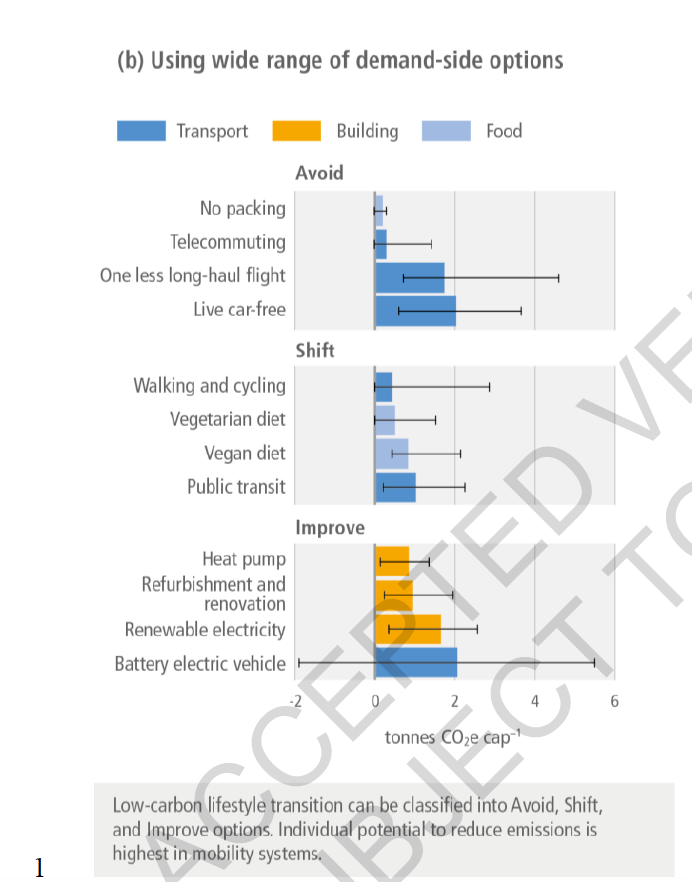
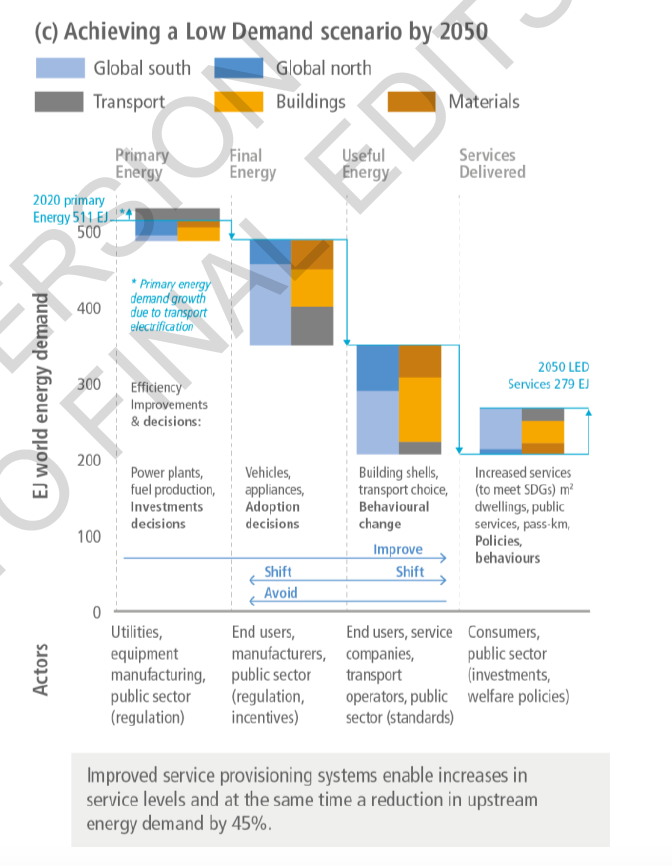
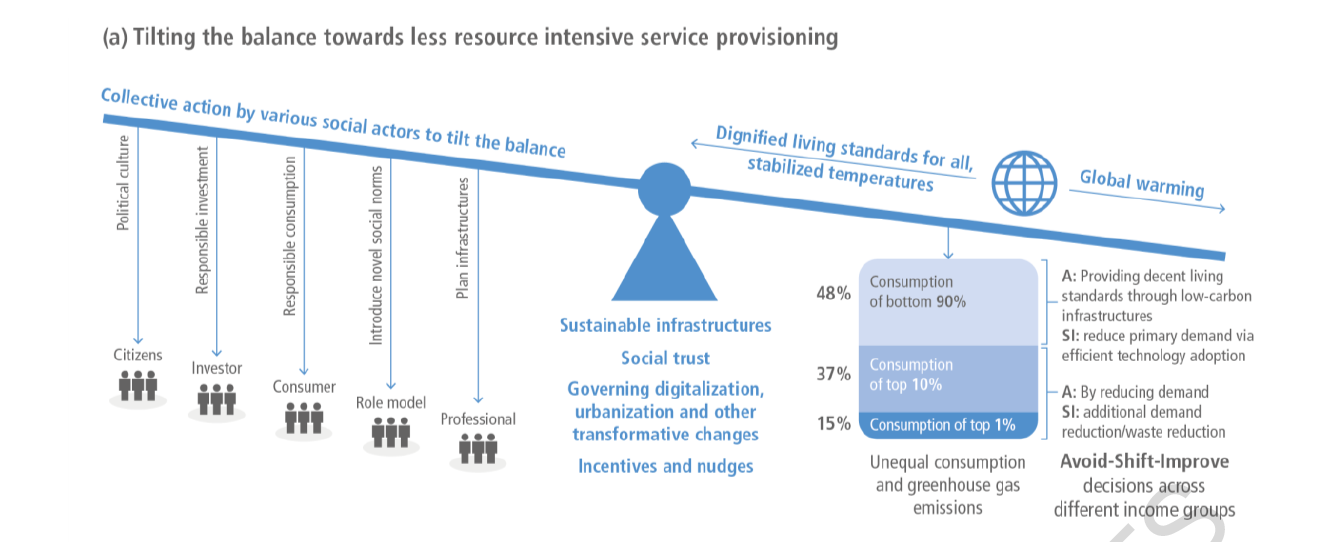
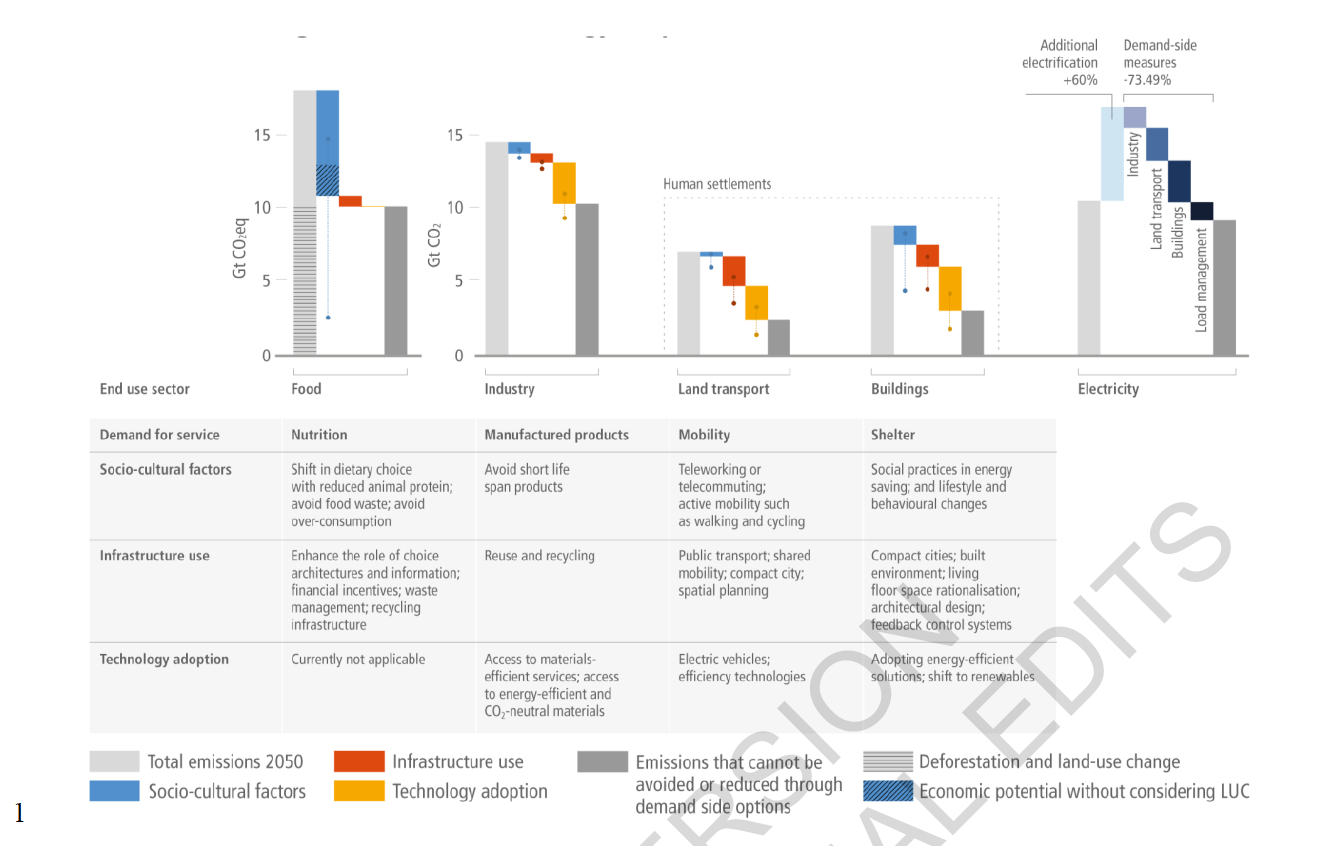
- Corporations are amongst the primary obstructions to climate action. Weird, because climate change is a huge risk for corporations too! Again, this point is entirely missing from the Summary for Policymakers but shows up repeatedly in both the report and the Technical Summary. On page 109, for example, the Technical Summary notes: "The current effects of climate change, as well as some mitigation strategies, are threatening the viability of existing business practices, while some corporate efforts also delay mitigation action." Some corporate efforts you say? Under that bulletpoint, the report authors expand: "Business models that protect rent extracting behaviour may sometimes delay political action." Did the IPCC just call some corporations rent-seeking assholes? Yes, yes it did. And there's more: "Corporate advertisement and brand building strategies may also attempt to deflect corporate responsibility to individuals or aim to appropriate climate care sentiments in their own brand–building." Helllooo the IPCC is talking about greenwashing, freakin finally.
- The role media plays—good and bad—in shaping climate policy is finally being acknowledged. This is in large part due to the involvement of sociologists in this report, like Max Boykoff, a contributing author, whose longstanding research on climate coverage in media underpins quite a bit here. The Technical Summary notes: "The media shapes the public discourse about climate mitigation. This can usefully build public support to accelerate mitigation action but may also be used to impede decarbonisation. Global media coverage (across a study of 59 countries) has been growing, from about 47,000 articles in 2016-17 to about 87,000 in 2020-21. Generally, the media representation of climate science has increased and become more accurate over time. On occasion, the propagation of scientifically misleading information by organized counter-movements has fuelled polarisation, with negative implications for climate policy."
- Eliminate fossil fuel subsidies already! Unfortunately, the Technical Summary doesn't say it so strongly, but it does provide all the evidence we need to say unequivocally that no government should be subsidizing the fossil fuel industry at this point; it's literally the least they could do, and it's a quick way to actually do something by 2030. The Technical Summary notes: "Removing fossil fuel subsidies could reduce emissions by 1-10% by 2030 while improving public revenue and macroeconomic performance." Literally good for everyone, just fucking do it already.


